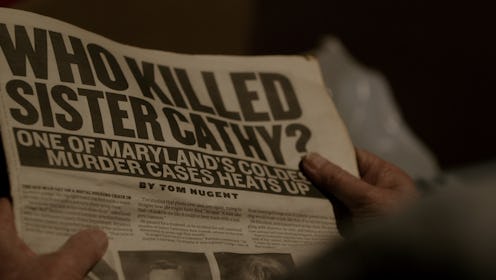
With recent entries like Casting JonBenét and The Keepers, Netflix is turning the true crime craze on its head. We're obsessed with real life mysteries, but should we be? In an interview with Bustle, director and executive producer of The Keepers, Ryan White, explains that trying to answer the question of who killed Sister Cathy Cesnik shouldn't be viewers' sole focus. Obviously, it's important that there is justice in her unsolved murder, but reducing The Keepers to a whodunnit takes away from the depth and bravery of the stories being told.
"These are real human stories," White says, "These [true crime shows] aren’t just murder mysteries, and therefore when we’re watching we need to consider that there are victims of these crimes." Because, after all, The Keepers isn't just about a murder. The series also explores the stories of many women who have accused Father Joseph Maskell of sexually abusing them when they attended Keough High School the the late '60s and early '70s. Cesnik taught at this school until her death in 1969, and the series theorizes that her murder may have come in an effort to silence her from speaking up about the alleged abuse of her students. Maskell denied the sexual assault accusations until his death in 2001. He was never charged in connection with Cesnik's case.
In response to the sexual assault allegations against Maskell, a spokesperson for the Archdiocese of Baltimore acknowledged the accusations in a statement to Bustle:
"Since the 1990s, when the Archdiocese of Baltimore first learned of an allegation of child sexual abuse against Maskell, and on numerous occasions since, the Archdiocese has publicly acknowledged and apologized for the horrific abuse committed by him. The Archdiocese reported the allegations to civil authorities in the 1990s and cooperated fully in any investigation, removed Father Maskell’s faculties to function as a priest, apologized to victims and offered them counseling assistance, sought additional victims, and provided direct financial assistance to 16 individuals abused by Maskell.
Though it was unaware of the abuse at the time it occurred approximately 50 years ago, the Archdiocese deeply regrets the damage that was caused to those who were so badly harmed and has worked diligently since becoming aware of their abuse to bring some measure of healing to them. The Archdiocese is wholly committed to protecting children, holding abusers accountable — clergy and laity alike, and promoting healing for victims. These are hallmarks of the Archdiocese’s child protection efforts, which we strive to constantly strengthen.
There is no room in the Archdiocese for anyone who would harm a child and every effort must be made to ensure what happened before never happens again. It is our hope that The Keepers advances this pursuit, just as we hope the series helps those who have kept alive the memory of Sr. Cathy and our collective hope that justice will be won for her."
The Keepers does seek to find justice for Cesnik, but it does more than just explore her murder. "I think The Keepers is a little bit different [from other true crime shows]," White says, "in that there is so much focus on the victims. That might be hard for people to watch, but I hope that people will bear witness to it, as painful as it may be, to make sure that this doesn’t continue happening and won't happen again."
Does White himself have a theory about Cesnik's death? Of course, but that's not his focus, nor is it the show's. "My theory might be different than my producer’s theory that’s different than my editor’s theory," White says. "I think it’s less important what my theory is. My hope is that audience members will get to experience what I did and come away with their own versions of the truth. I feel like we, to the best of our abilities, responsibly presented all of these narratives and things that have been urban legends and folklore in Baltimore over the last 45 years."
The theorized connection between the murder and the abuse is more important than just the killer's identity, in his opinion. "I know that people are going to watch this and there’s also going to be a whodunnit part of it," White says, "but Sister Cathy died most likely because she was protecting these children and I don’t think you can unravel the two."
Ultimately, he hopes that audiences will watch and talk about everything presented, and focus more on Cathy herself and her plight as well as the stories told by the women who survived Maskell's alleged abuse. "You can’t separate the murder from the abuse and the coverups of that abuse," he says. That's the real takeaway from The Keepers, so maybe leave your spyglass at home for this one.
Additional reporting by Martha Sorren.